This wild sockeye salmon is baked in the oven with an herbed garlic caper citrus crust for an easy, healthy meal. With a bake time of just 10-12 minutes, there’s no reason to not make this sockeye salmon recipe part of your weeknight dinner rotation!
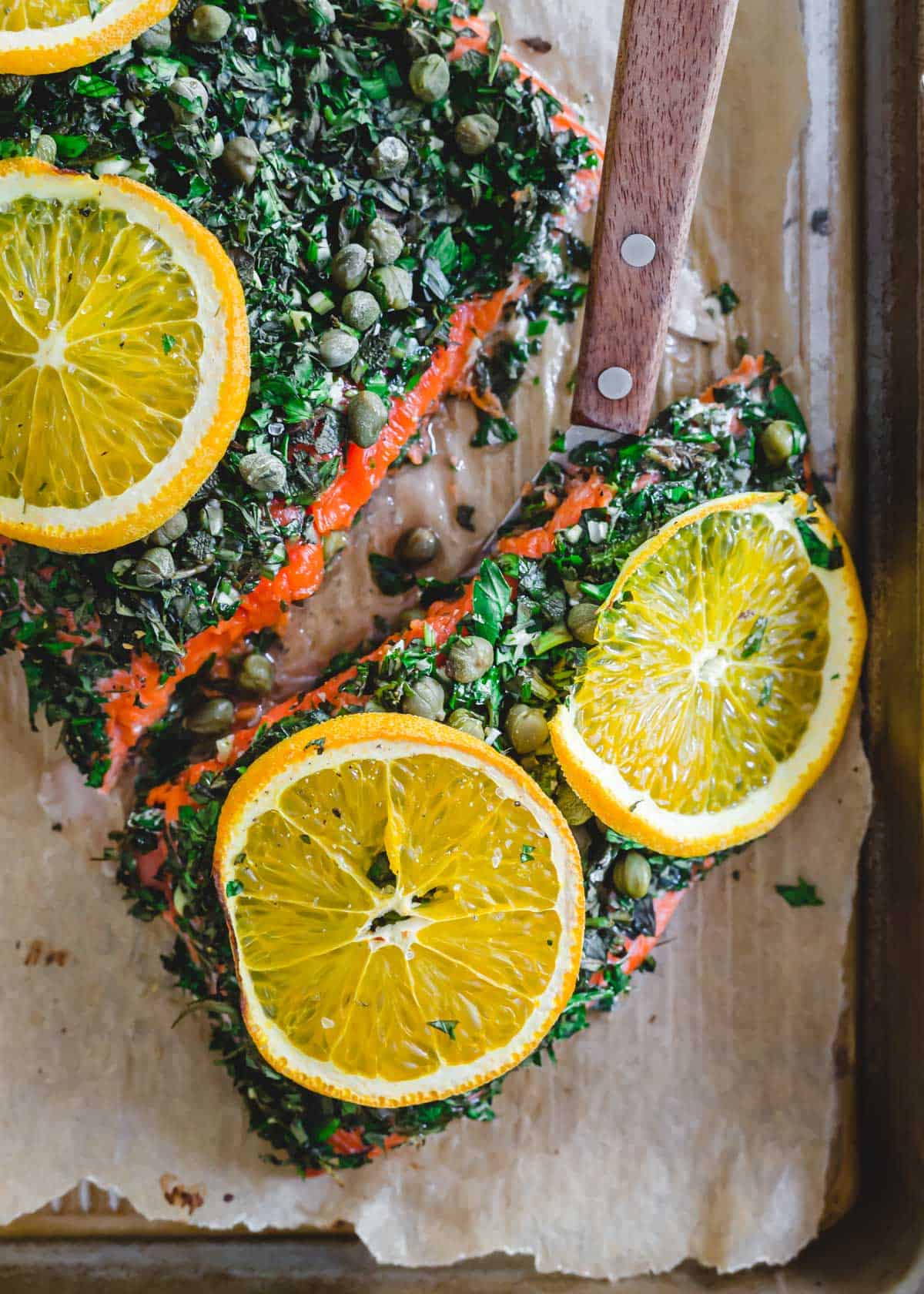
I was lucky enough to take a trip out to Cordova, Alaska in the summer of 2015 to see wild sockeye salmon in person.
It was during their annual run up the Copper River to spawn and witnessing the life cycle of these beautiful fish was one of the most impactful events of my life.
I wrote about that trip in my sriracha honey salmon recipe if you want to read all the details.
Fast forward 6 years and here we are today with this wild sockeye salmon recipe.
Two gorgeous sockeye salmon filets were graciously shipped to me by Copper River Salmon and Prince William Sound Salmon overnight from Alaska arriving on my doorstep before 10am the next day earlier this week.
To not cook this gorgeous wild salmon that day would’ve been a sin.
So, after a jaunt to my raised bed outside bursting with fresh herbs, this baked sockeye salmon recipe was born.
Fresh, bright red wild Alaskan sockeye salmon is coated in a fresh herb, garlic and caper crust then dotted with orange slices and baked until just perfectly cooked.
It’s a meal that can be made in 20 minutes start to finish and it’s one of the most beautiful and freshest ways to enjoy a healthy wild salmon dinner I can think of.
I saved the other filet for making marinated air fried salmon bites in a few days — another recipe that lets the fresh salmon shine.
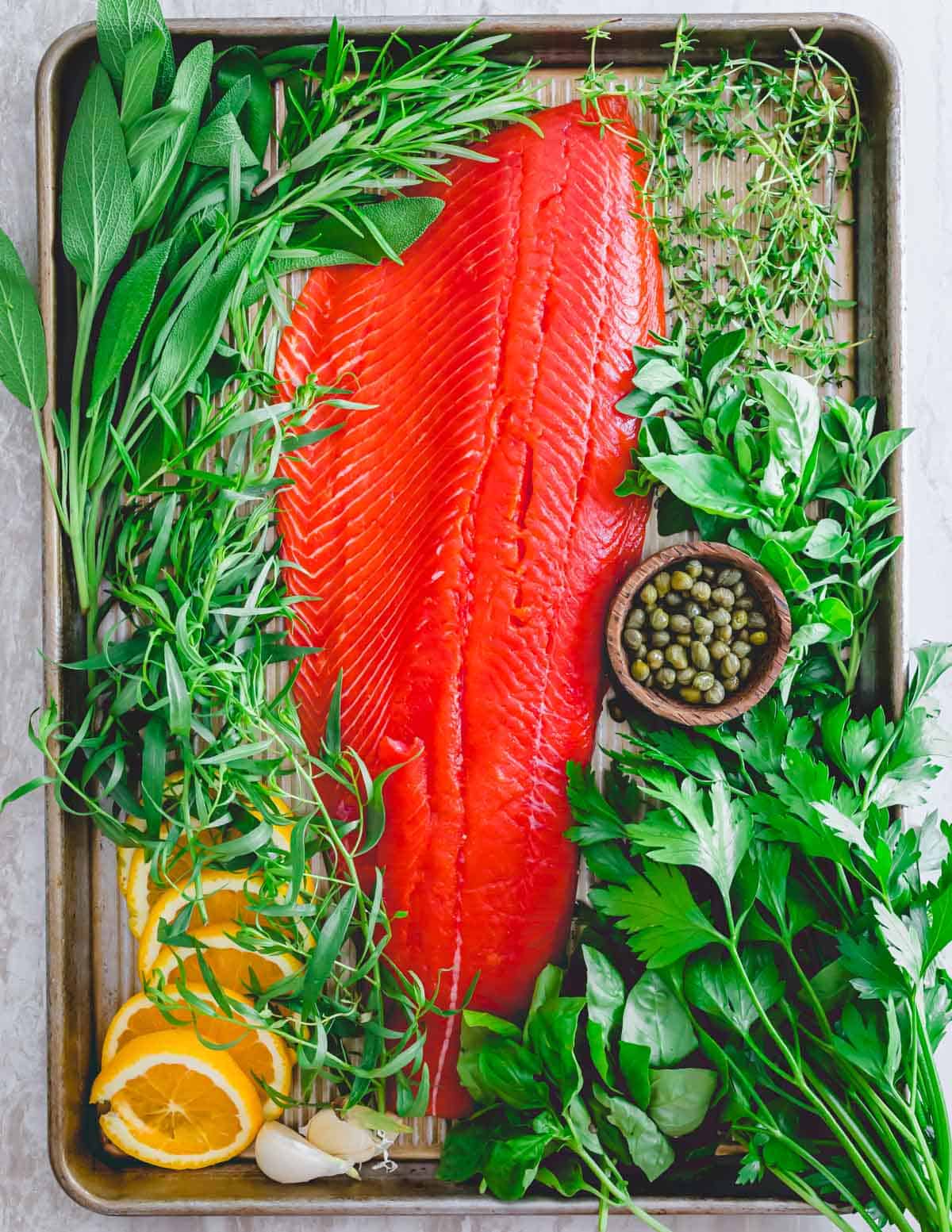
TYPES OF WILD PACIFIC SALMON
Before getting into this baked sockeye salmon recipe, let’s talk about the different types of wild salmon there are.
First off, I won’t even discuss farmed salmon (typically Atlantic salmon) because it’s not something I ever consider eating any longer after visiting Alaska and understanding the differences in sustainability and nutrition. This article does a good job rounding up the differences if you’re interested.
Wild Pacific salmon varieties include:
- Sockeye salmon – also called red salmon
- Chinook salmon – also called king salmon
- Pink salmon – also called humpback salmon
- Coho salmon – also called silver salmon
- Chum salmon – also called dog or keta salmon
With all the varieties having more than one name, it can definitely get confusing!
I’m sure you’ve heard of Chinook or “king” salmon as it’s the most “prized” one of them all for its high fat content (it swims the farthest upstream to spawn so it needs extra fat stores!). This is the most sought after type but also the most expensive.
Pink or chum salmon are smaller and more affordable fish. These varieties are what you’ll find when buying canned wild salmon 99% of the time. And what my dijon dill salmon salad is made with. They’re also often used for smoking.
That leaves Coho and Sockeye as the two other main wild salmon you’ll typically see in stores being sold fresh or frozen as fillets.
Coho salmon is lighter in color and milder than Sockeye.
HOW IS SOCKEYE SALMON DIFFERENT?
Sockeye salmon’s most distinguishing characteristic is its deep red color and stronger flavor.
It has a higher fat content than Coho and also stands up to grilling better.
It’s often neck and neck with King salmon as the number one choice but with its lower price point and wider availability, I personally think it wins out.
If you buy frozen wild salmon, it’s often the sockeye variety. For easy meals, I like to make frozen sockeye salmon in the air fryer.
WHAT’S THE BEST TYPE OF SALMON TO EAT?
If I had to rate my preferences of the three main types of wild salmon it’d go in this order:
Sockeye –> King –> Coho.
I think sockeye salmon has the best of both worlds in terms of flavor and richness.
King is good but personally I feel like the fat overpowers the flavor.
Coho is my last choice because it can be hard to keep moist when cooking and its flavor is not as desirable as the other two. But, I’ll still happily eat it over farmed salmon any day.
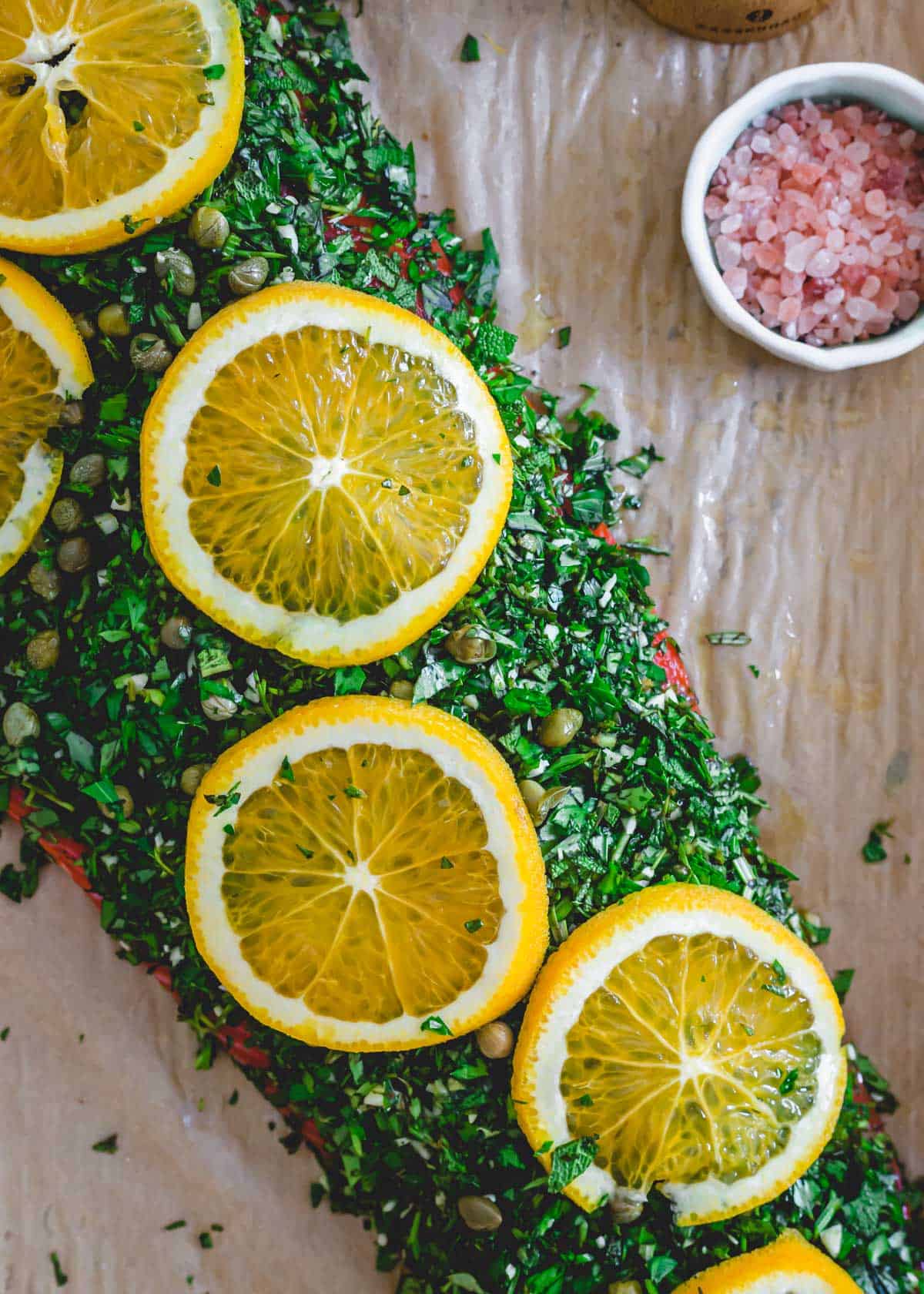
BAKED WILD SOCKEYE SALMON RECIPE
Ok, now that we got those facts out of the way (and hopefully you feel a bit more clear on what’s what!) let’s talk about this easy sockeye salmon recipe and what you’ll need to make it.
- one large (about 2 pounds) wild sockeye salmon fillet
- 1 cup minced fresh herbs (use any assortment of herbs)
- 3 cloves garlic
- capers
- 1/2 orange
- extra virgin olive oil
- salt and pepper
That’s it! The ingredient list is simple because wild salmon this fresh doesn’t need anything complex.
Honestly, it would be a disservice to the salmon to cover up its flavor with a laundry list of ingredients and flavors.
There aren’t many ingredients but each has a specific role so don’t be tempted to omit anything. Especially the capers as their briny, tangy flavor complements the fresh herbs and lemon really well. They’re why cod piccata and salmon piccata are such delicious dishes too!
I also love this sheet pan turmeric salmon recipe for its simplicity when working with fresh wild salmon like this.
If you have salmon steaks instead of filets, give this salmon steak recipe a try instead.
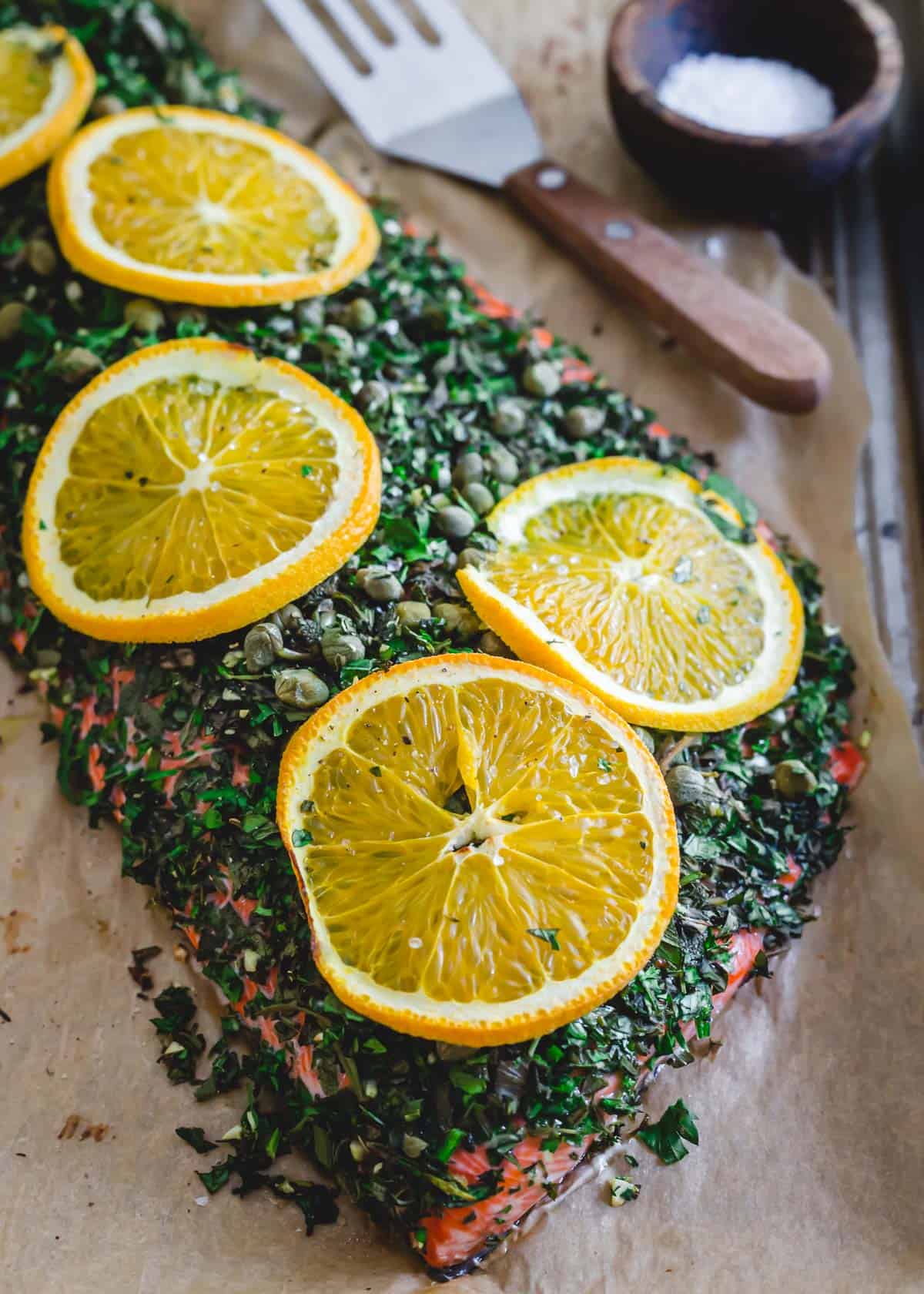
HOW TO BAKE WILD ALASKAN SOCKEYE SALMON
Start by preheating the oven to 450°F.
Line a large, heavy duty baking sheet with parchment paper. I love my half sheet USA pan for this. I’ve had it for over 10 years and it’s never warped.
Combine the minced herbs with the minced garlic and capers.
Place the salmon on the baking sheet and squeeze the end of the orange over the top of the salmon.
Season generously with salt and pepper then drizzle with olive oil.
Coat the entire surface of the salmon with the herb mixture patting it down to stick using your hands.
Arrange the orange slices on top of the herbs in a scattered pattern.
Bake the salmon in the oven for 10-12 minutes until just cooked through.
The salmon should still be bright red when the thickest part of the filet is cut through but cooked and not raw.
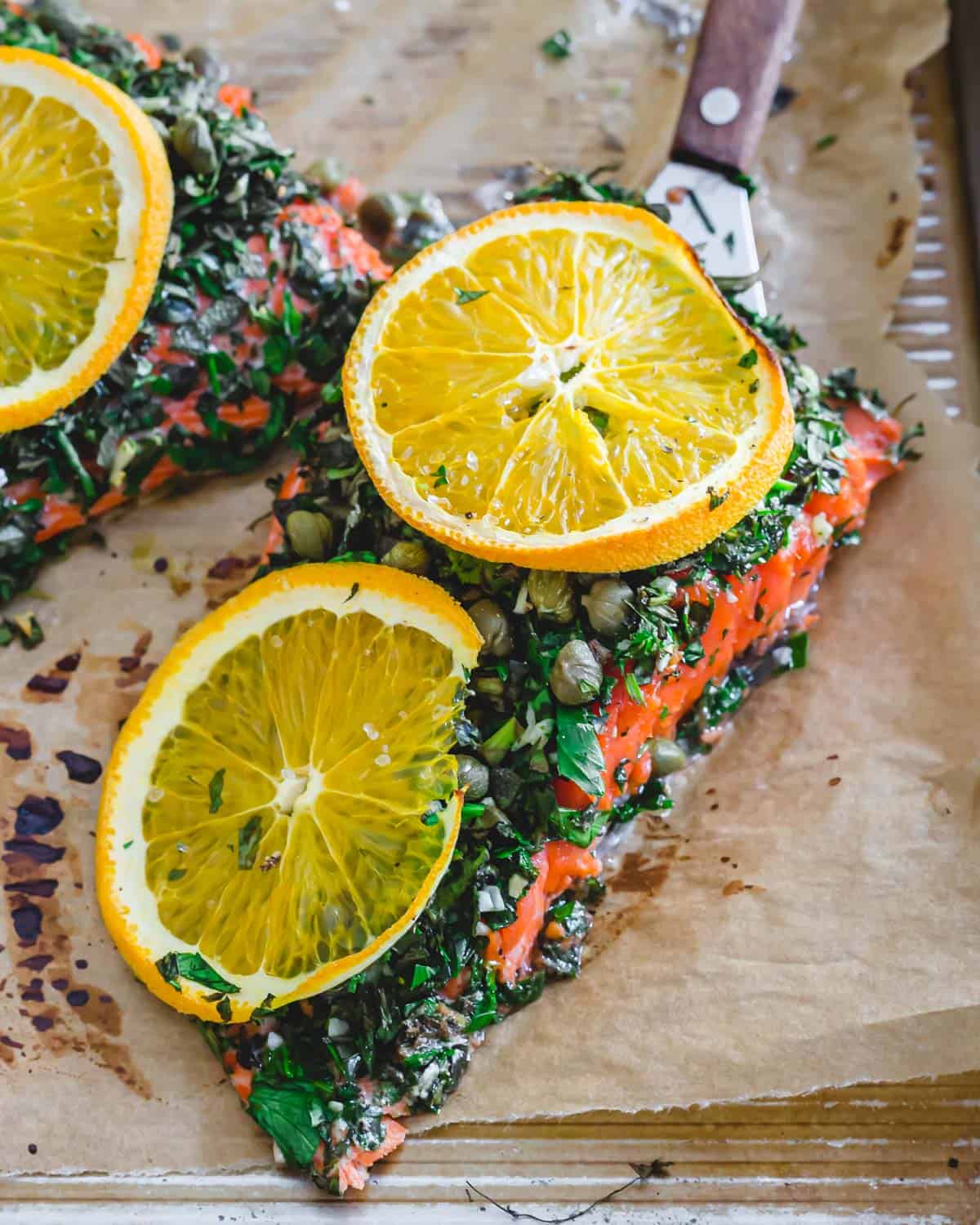
HOW DO YOU COOK SOCKEYE SALMON WITHOUT DRYING IT OUT
No one enjoys dried out fish, salmon or other!
The most important thing to know about keeping sockeye salmon moist is not to overcook it.
I know it sounds overly simplistic and borderline patronizing but it’s the truth.
Sockeye salmon fillets can be cooked in as little as 7 minutes depending on the thickness.
When I’m using frozen wild sockeye salmon from a store (like BJs where I often buy it in bulk) that comes packaged pre-cut into fillets, I will set the timer on the oven for 6 minutes and assess at that point.
For an entire filet like this, I knew the thickness warranted extra time so I set the timer to 8 minutes and cut into the salmon at that point to check.
I returned it to the oven for another 3 minutes when I noticed the inside still a bit raw.
You can always cook the salmon longer but you can’t take away cooking time.
Another thing to note with sockeye salmon is that it will retain its bright red color when cooked.
Don’t confuse the deep color (like you see below) with the fish being raw. I assure you this is salmon is not raw.
The flesh should be bright red like in these pictures and still moist.
Sometimes I think salmon has caught a bit of the bad reputation Brussels sprouts have unfortunately endured with a history of overcooking leading people to believe they don’t like the two foods.
Reality is, it’s the preparation you probably don’t like, not the food itself.
And if you happen to need a good side dish recipe for this baked sockeye salmon, these roasted Brussels sprouts on the stalk are delicious and not overcooked!
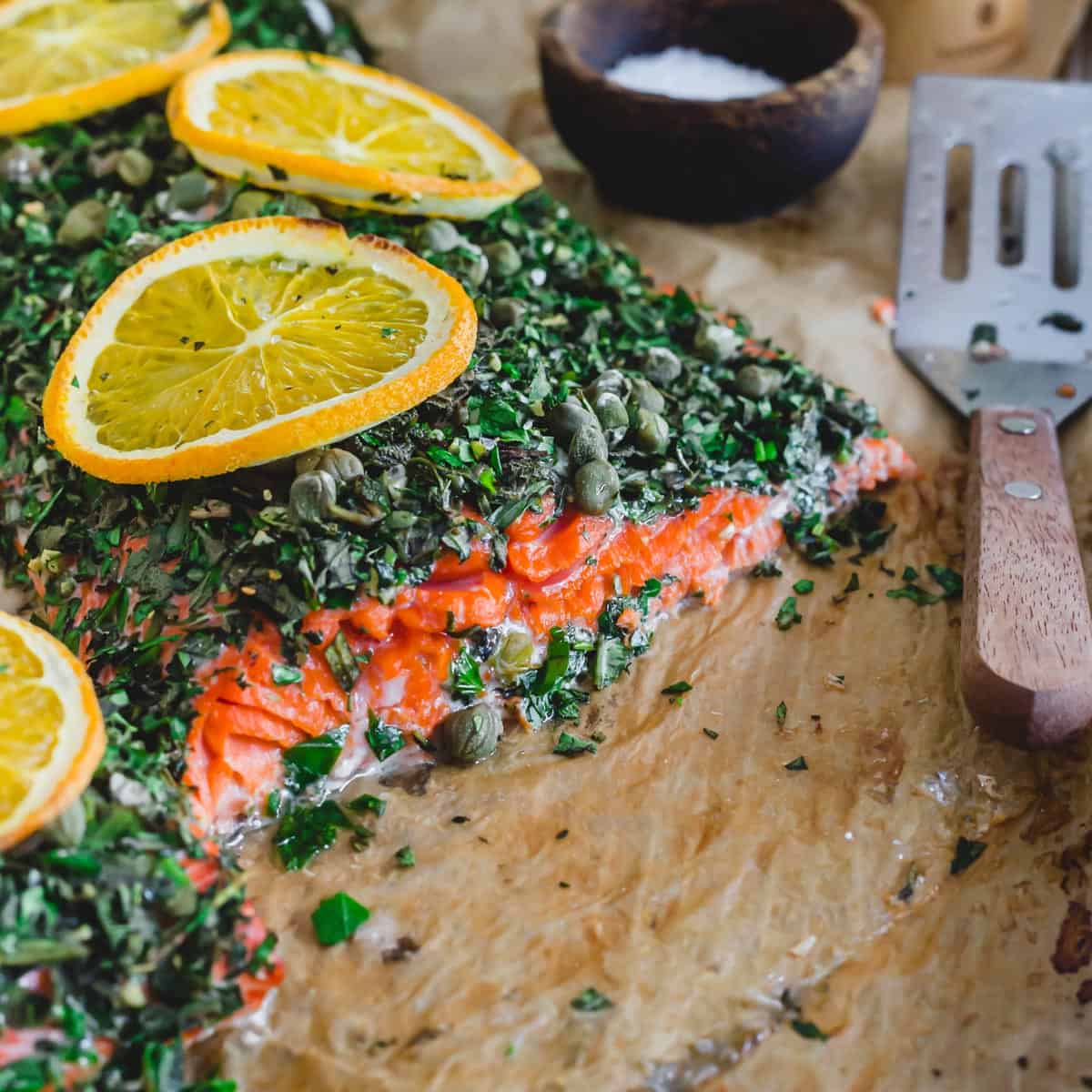
IS WILD SOCKEYE SALMON GOOD FOR YOU?
You’ve likely heard how salmon contains heart healthy omega-3 fats.
Well, sockeye salmon has the highest levels of omega-3 fats of any type of salmon.
Wild sockeye salmon is also one of the few foods that’s a source of naturally occurring vitamin D.
It’s also high in B vitamins, selenium and of course, a great source of high quality lean protein.
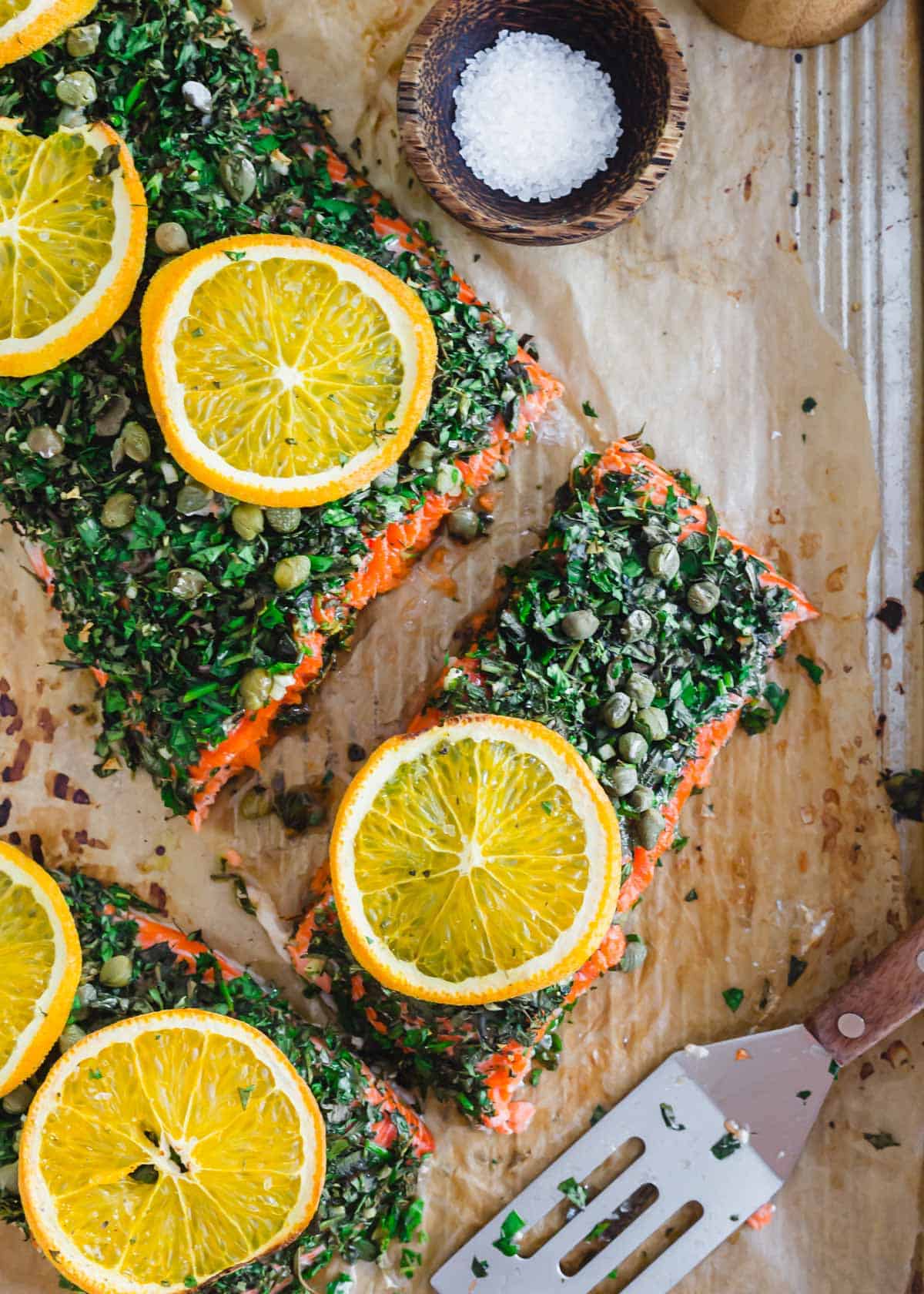
WHAT TO SERVE WITH THIS SOCKEYE SALMON RECIPE
A simple meal like this is best enjoyed with some simple sides. No point in a 20 minute salmon recipe if the sides are complicated, right?!
I love serving salmon with baked potatoes or rice. Mashed purple sweet potatoes are a favorite or, just simply bake the sweet potato in the oven before putting the salmon in.
For vegetables, grilled green beans, roasted turnips, air fryer carrots or, this garlic roasted potatoes and asparagus recipe that combines the starch and vegetables are all great choices.
If you want to drizzle a sauce on top of this baked sockeye salmon, this lemon herb tahini dressing makes a delicious pairing with the herbs, garlic and capers in this recipe.
STORING AND REHEATING BAKED SOCKEYE SALMON
This recipe is undoubtedly best served fresh so I like to buy what I plan on eating for that meal and no more.
However, you can store leftovers in an airtight container in the fridge for a day or two.
Reheat the salmon slowly to not dry it out.
This is one of the reasons I don’t love salmon leftovers – it’s hard to control the reheating process from overcooking the salmon.
If you are eating it leftover, consider eating the salmon in a salad cold instead of warm to avoid potentially overcooking it.
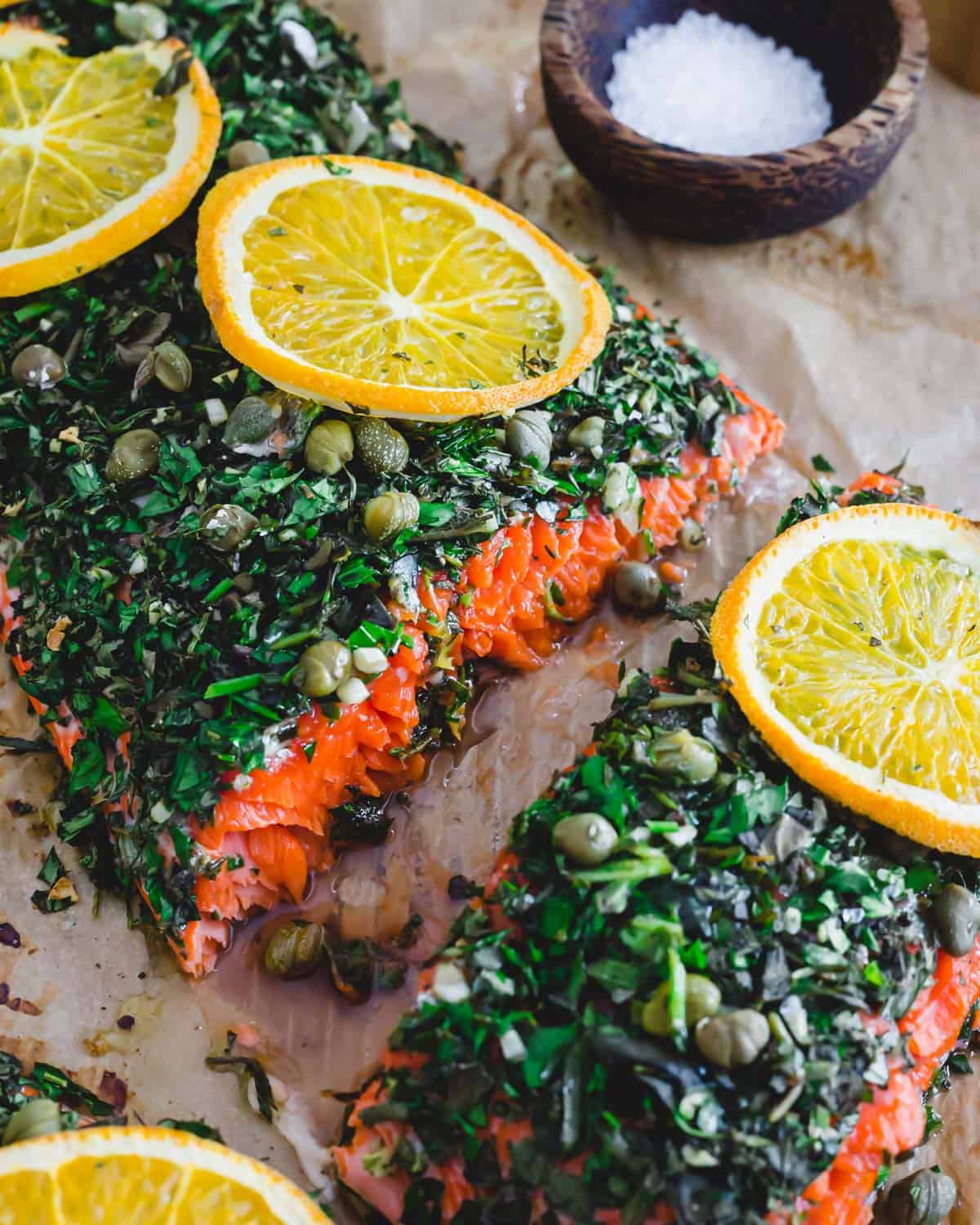
LOOKING FOR MORE SALMON RECIPES? TRY THESE:
Seared salmon with tomato corn salsa
Blackened salmon tacos
Tart cherry glazed salmon
Smoked salmon BLT with avocado
Crispy salmon bites
Baked Wild Sockeye Salmon
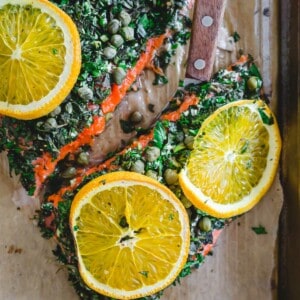
Ingredients
- 2 pounds wild sockeye salmon fillet
- 1 cup minced fresh herbs, see note
- 3 cloves garlic, minced
- 2 tablespoons capers, drained
- 1/2 an orange, sliced with end piece reserved
- 1 tablespoons extra virgin olive oil
- salt and pepper
Instructions
- Preheat oven to 450°F and line a large, heavy bottomed baking sheet with parchment paper.
- Combine minced herbs, garlic and capers in a bowl.
- Squeeze the end of the orange over the salmon filet, season with salt and pepper then drizzle with olive oil.
- Coat the salmon with the herb mixture patting it down on top of the entire surface area of the filet.
- Arrange the slices of orange on top of the herbs in a scattered pattern.
- Bake for 10-12 minutes depending on the thickness of your salmon. Do not overcook! The thick part of the filet should be bright red and moist. Check at 10 minutes only returning to the oven if necessary for 2 minute increments.
Notes
Nutrition
Nutrition information is automatically calculated, so should only be used as an approximation.
Web Story – Baked Sockeye Salmon
Gina Matsoukas is an AP syndicated writer. She is the founder, photographer and recipe developer of Running to the Kitchen — a food website focused on providing healthy, wholesome recipes using fresh and seasonal ingredients. Her work has been featured in numerous media outlets both digital and print, including MSN, Huffington post, Buzzfeed, Women’s Health and Food Network.

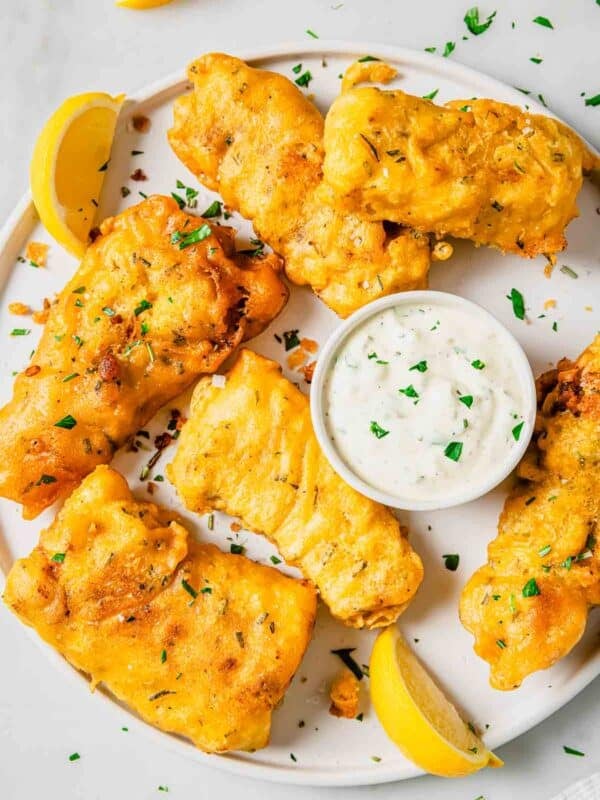
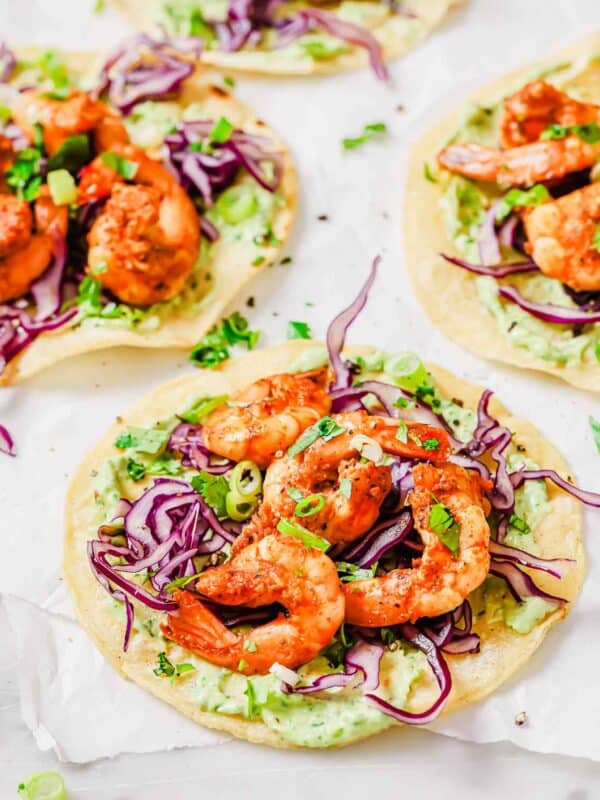
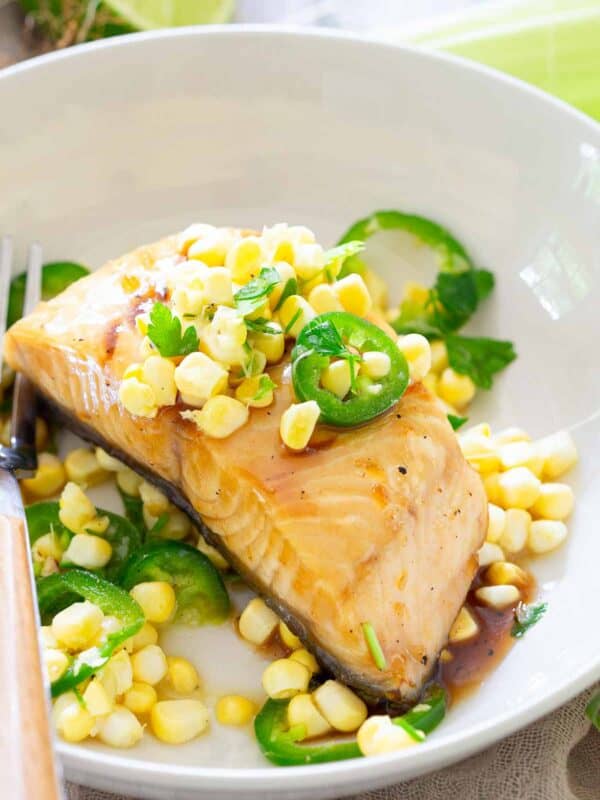
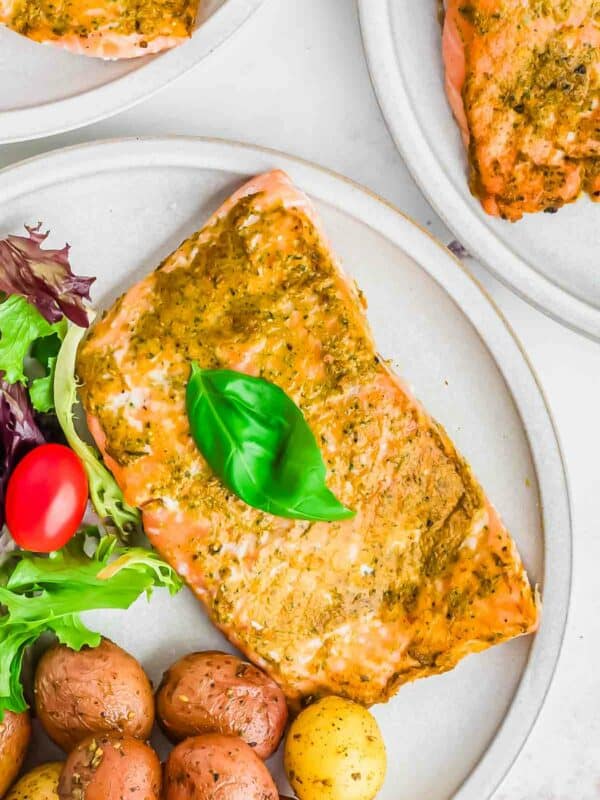








I’ve tried this recipe so many time,s and I just love it!
Hi, thanks for the recipe! I think it will be delicious 😋 Just 2 questions please… bake covered or uncovered? Skin side down I presume?
Yes, skin side down and uncovered.
Great recipe! Definitely enjoyed and will recommend.